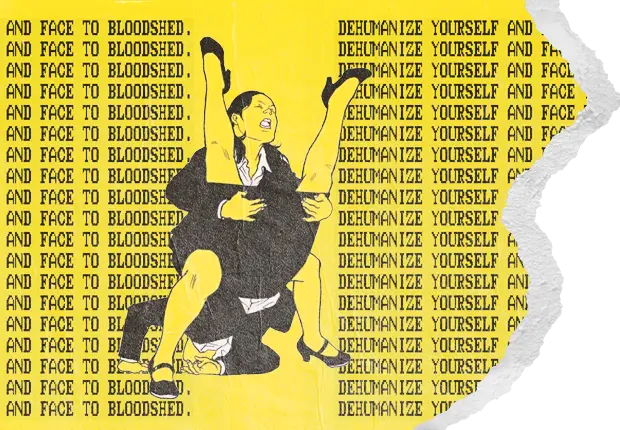Vulnerability Isn’t a Strength
Let me borrow your internal movie maker for a bit. I’d like you to imagine a war room constructed within a tent. In it, there’s a huge map sprawled on top of a big table surrounded by hard men. What type of warriors are they? Horse-riding samurai? Anglo-Saxons in heavy, jingling mail? Modern spec-ops guys kitted out in plate carriers and FAST helmets? It doesn’t really matter. What matters is that they’re all gathered around, analyzing the enemy’s position, and that at least one of them is smoking a pipe.
Picture one of the men closest to the table—preferably not the pipe smoker—pressing a dusty finger onto the map. He can be pointing at a gate, a tunnel, or any particular building. It doesn’t make much of a difference, so long as he’s indicating a spot that the enemy would have a difficult time defending, monitoring, and/or restricting access to. Now, imagine him speaking up, probably in a higher-pitched voice than you might have otherwise expected.
“Here’s the weakest point in our enemy’s position—the place where they’re the most vulnerable.” A few heads nod. There are a couple of grunts of agreement as the others see it, too. So, he carries on. “Then, by all means and at all costs, we should avoid it because, you know, vulnerability is strength.” The room goes quiet.
I picture him standing up a bit taller, convinced that what he just said is both profound and useful. In my mind, he’s smacking fruit-flavored gum while everyone else in the tent is trying to wrap their heads around the nonsense that came out of his mouth. Finally, someone breaks the silence—it’s the guy with the pipe.
“What in the hell did you just say?” he says, or perhaps something a bit more colorful.
If the reply from Captain Vulnerability is anything other than a laugh and an admission that he was just fucking around, he’ll likely be stripped of command faster than a knife fight in a phone booth. Rightly so, because he’s an idiot. Vulnerability isn’t a strength. We know this intuitively, yet people (psychotherapists, teachers, life coaches, etc.) will proclaim otherwise, and they will do so loudly. This wouldn’t be a big deal, except that the way a person and, more importantly, a society defines strength actually matters. It has real-world implications, many of which we are only now beginning to see in the modern world.
VULNERABILITY:
When challenging an idea, it can be useful to start with things that both sides agree upon. So, let’s start with a list of things that any reasonable person would consider vulnerable. Since we’re talking about living things—humans—we’ll stick to examples of other living things.
Infants.
Babies are universally considered to be vulnerable. For the first few months, they’re like human larvae, covered in grubworm folds and wriggling about clumsily. Their need for protection and provision is so absolute that it’s baked into the biology of parents—most of them, anyhow. Infants have zero defenses beyond their ability to hijack our peripheral nervous system via their car-alarm-level wailing, and they rely completely on others for their survival. Babies are inarguably vulnerable.
Old people.
The older, the better. The very old among us are highly susceptible to all sorts of injury and maleficence from ne’er do wells and physics alike. Whereas young people can oftentimes take a long trip off a short set of stairs and land like Willy Wonka losing his cane in a cobblestone crack (or at least avoid catastrophic injury), a small fall for an old person can lead to serious injury—sometimes even death. Additionally, old folks are particularly soft targets for scammers and crooks alike. Any delinquent with the upper body strength of a teenage boy can overpower the vast majority of them. Elderly people are very vulnerable.
Endangered species!
Endangered species are so vulnerable that the two words are interchangeable. By definition, their entire genus is near extinction. That’s pretty vulnerable. Each of these are rock-solid examples of vulnerability. All three have a heightened susceptibility to injury, attack, and/or mortality if left alone to the natural order of things. That doesn’t remotely sound like strength to me. Vulnerability and strength can be related, in the way that fear and bravery can be related, but the two words are nowhere near synonymous. So how did an idea as bad as vulnerability is strength take hold of the collective?
VERBAL SHELL GAMES:
People manipulate language for all sorts of reasons. Good poets make art with words, bending and distorting dense and distillate forms for effect. Novelists construct vivid worlds that feel both real and familiar using only their lexicon. Comedians become masters of misdirection and wordplay in order to snap together ideas at the perfect time to ignite amphitheaters of people into shared laughter. These verbal manipulations, in their purer forms, are done in the spirit of beauty, benevolence, and play.
However, when people use language to distort public perception on a matter—attempting to reconfigure reality—the human capacity for linguistic manipulation becomes malignant. Sometimes, it’s immediately evident and stomped out quickly. Other times, the effects may take a while to fully manifest. While I’m not saying that the most well-known among those who succeeded in artificially elevating vulnerability as a virtue knew full well what they were doing, I am saying that they poured gasoline onto the embers of victimhood that have since become a raging fire of resentment capable of consuming the West.
There were many ideological chefs in the soup kitchen that cooked up the notion that vulnerability is strength. Most of them were in psychology and adjacent fields. However, no one person has put the idea more firmly and permanently on the cultural menu than Brené Brown. Brown is a social worker, self-proclaimed researcher, and sociology professor who has spent the past two decades working tirelessly to both destigmatize shame and normalize vulnerability. She’s written six number-one New York Times bestsellers. She’s been on Oprah a handful of times. At the time of writing this, her TEDx talk has over 65 million views. In short, she’s the heavy-hitter when it comes to how this bad idea reached escape velocity.
Brown has become so iconic in our overly psychologized culture that her books and TED talk have become a staple in graduate and undergraduate psychology programs alike. There’s one quote in particular that you’ll see plastered all over Pinterest as well as on the websites of mid-level psychotherapy private practices.
“Vulnerability sounds like truth and feels like courage. Truth and courage aren’t always comfortable, but they’re never weakness”.
There’s a trick here. Did you see it? It’s a little manipulative rhetorical device called equivocation, which is a sort of linguistic shell game by which the speaker can cycle between words quickly enough to blur the distinction between them. Usually, as is the case with Brown’s example, it’s to bend or outright replace the definition of one term in particular.
We draw two lexical comparisons almost immediately when hearing the quote. Firstly, vulnerability sounds like neither truth nor courage, but we understand what she means. She means that speaking truthfully can sometimes make a person vulnerable to attack, judgment, or ostracism from a group. This is true and something I imagine we’ve all experienced at one point or another.
Secondly, we’re told that a link exists between vulnerability and courage. This is also true. If you’re vulnerable and susceptible to injury or harm, it does take courage to run into a burning building. It’s the whole reason we laud the insanity of firefighters.
The real mastery of the trick, however, comes at the tail end of the statement—the part of the play that con artists running a shell game would call “Palming the Pea.” Brown primes us for false agreement with two more truths: both truth and courage can be uncomfortable, and neither is a weakness.
Then, she flicks her wrist and waits for you to pull up a cup that, to your astonishment, will have nothing underneath it. Did you see the play? Did you catch the if A ≈ B and B ≠ C, then A ≠ C conflation that leads so many people to a distorted notion that vulnerability can somehow be analogous to strength? Most people can’t see the sleight of hand. Why not?
A WILLINGNESS TO BE DECEIVED:
You can make a slew of arguments as to why some of us would be more susceptible to lexical manipulation than others (e.g., low verbal IQ, confirmation bias, the relief of cognitive dissonance, etc.). I think the answer as to why so many people are willing to buy into the notion that vulnerability is strength is much simpler.
People respond to incentives.
Strength—the capacity to withstand great force or pressure—is really difficult to attain. That’s true for physical strength, mental strength, emotional strength, moral strength, and any other strength you can imagine. Becoming strong takes work, whether it’s the type that resists gravity or existential suffering.
Strength is hard-earned through the time, effort, and willpower required to become the type of person who isn’t quick to buckle. It’s not easy. It’s not supposed to be. If it was, I argue that it wouldn’t be something that we instinctively, collectively, and universally value. Nor, interestingly enough, would it be something with enough benefit to make it worth subverting.
If people are assigned social status, respect, and reputation based upon the level of strength that they’ve cultivated—which they are, consciously or unconsciously—the egalitarian types run into a dilemma. What do they do about people who don’t want to “do the work” but still want to be seen as strong and formidable? Shouldn’t those people likewise have access to the admiration of others? Isn’t it unfair that they should have to voluntarily subject themselves to uncomfortable and drawn-out processes of contending with austerity, growth, and humility to be considered laudable by society?
That doesn’t seem very equitable.
The problem with this type of reasoning is that a firefighter isn’t virtuous solely for being flammable. A functioning society holds firefighters in high esteem because—despite being flammable—they voluntarily run into burning buildings to save strangers. Thankfully, not all people seek the easy path in life. Some people understand the value of becoming the type of creature who can make molehills out of mountains rather than the reverse. These people are worthy of our respect and admiration. They’ve earned it.
If the vulnerability cult were to put forth the idea that vulnerability isn’t always a bad thing—when coupled with legitimate virtues—I would be open to hearing the argument. If they were to say that discriminant vulnerability is an essential part of the sort of emotional maturity that leads to rich relationships, I’m on board with that message. An overly hard and cold man doesn’t make for a good father or husband, but neither does the opposite—a man who is incapable of being strong when those who rely upon him need it most.
Does it matter if some lady conflates words to sell books? Maybe not. Does it impact society at large if she manages to get onto talk shows and offers people an overly convenient worldview, as well as access to unearned status? It depends on how many people believe it. If enough people buy into the notion that being vulnerable is somehow strength, it erodes the value of strength itself and undermines the accomplishments of the type of people that we depend on—whether we want to admit it or not.
Physically strong men protect others. Emotionally strong men keep their feelings out of the driver’s seat when dangerous things need doing. Mentally strong men do the seemingly impossible things that allow a culture’s lights to stay on—so that the general public can continue to have access to safety, Wi-Fi, and frappuccinos.
Strength is the primary load-bearing pillar of masculinity through which young men, in particular, find a way to earn their place in society. It’s the currency of their contribution. No amount of doublespeak or oppositional defiance on daytime talk shows will change this—nor will it change how much the world desperately needs more of it. Words have meaning. Vulnerability isn’t strength. Strength is strength. More importantly, how we define it matters.

































